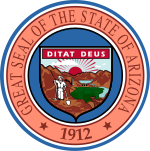This article needs additional citations for verification. (May 2009) |
| Elections in Arizona |
|---|
 |
Arizona Proposition 203, also known as English for the Children, is a ballot initiative that was passed by 63% of Arizona voters on November 7, 2000. It limited the type of instruction available to English language learner (ELL) students. Before Proposition 203, schools were free in terms of ELL instruction to use bilingual or immersion methods. According to a cover letter from the Arizona Department of Education Superintendent of Public Instruction Lisa Graham Keegan to the Arizona Legislature, it was impossible to make a correct analysis regarding how many students were learning through English as a second language programs, as opposed to bilingual education. The school districts had submitted "conflicting information," and 40% had not submitted any data, in spite of three deadline extensions.[1]
Proposition 203, like the similar California Proposition 227, was named after its financial supporter Ron Unz, a Silicon Valley software entrepreneur. 61% of the voters had passed Proposition 227. Arizona, Massachusetts, and Colorado followed with similar campaigns directed by Unz. On November 5, 2002, Question 2 in Massachusetts was passed by 68% of the voters, but Amendment 31 in Colorado was rejected by 56% of the voters. Unz's goal was to replace bilingual education with structured or sheltered English immersion programs. The book English for the Children: Mandated by the People, Skewed by Politicians and Special Interests by Johanna J. Haver (Rowman & Littlefield Education, 2013) reconstructs the politics surrounding Unz's movement and its effects on the education of ELLs.
- ^ Lisa Graham Keegan, "English Acquisition Services: A Summary of Bilingual Programs and English as a Second Language Programs for School Year 1997-8," Report of the Superintendent of Public Instruction to the Arizona Legislature, January 1999, cover letter.